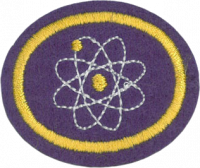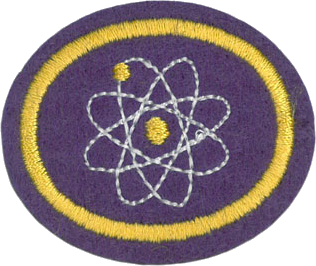Difference between revisions of "AY Honors/Physics/Requirements"
Jomegat bot (talk | contribs) (Bot: Automated import of articles) |
m |
||
| (11 intermediate revisions by 2 users not shown) | |||
| Line 1: | Line 1: | ||
| − | < | + | {{HonorSubpage}} |
| − | <noinclude><translate></noinclude> | + | |
| − | == | + | <section begin=Body /> |
| − | + | ||
| − | + | <b>1. <section begin=req1 /><noinclude><translate><!--T:1--> | |
| − | + | </noinclude>Define the following: | |
| − | + | <noinclude></translate></noinclude><section end=req1 /></b> | |
| − | + | ||
| − | + | :<b>a. <section begin=req1a /><noinclude><translate><!--T:2--> | |
| − | + | </noinclude>Physics | |
| − | + | <noinclude></translate></noinclude><section end=req1a /></b> | |
| − | + | ||
| − | + | :<b>b. <section begin=req1b /><noinclude><translate><!--T:3--> | |
| − | + | </noinclude>Mass | |
| − | + | <noinclude></translate></noinclude><section end=req1b /></b> | |
| − | + | ||
| − | + | :<b>c. <section begin=req1c /><noinclude><translate><!--T:4--> | |
| − | + | </noinclude>Work | |
| − | + | <noinclude></translate></noinclude><section end=req1c /></b> | |
| − | + | ||
| − | + | :<b>d. <section begin=req1d /><noinclude><translate><!--T:5--> | |
| − | + | </noinclude>Force | |
| − | + | <noinclude></translate></noinclude><section end=req1d /></b> | |
| − | + | ||
| − | + | :<b>e. <section begin=req1e /><noinclude><translate><!--T:6--> | |
| − | + | </noinclude>Power | |
| − | + | <noinclude></translate></noinclude><section end=req1e /></b> | |
| − | + | ||
| − | + | :<b>f. <section begin=req1f /><noinclude><translate><!--T:7--> | |
| − | + | </noinclude>Potential energy | |
| − | + | <noinclude></translate></noinclude><section end=req1f /></b> | |
| − | <noinclude></translate></noinclude> | + | |
| + | :<b>g. <section begin=req1g /><noinclude><translate><!--T:8--> | ||
| + | </noinclude>Kinetic energy | ||
| + | <noinclude></translate></noinclude><section end=req1g /></b> | ||
| + | |||
| + | :<b>h. <section begin=req1h /><noinclude><translate><!--T:9--> | ||
| + | </noinclude>Weight | ||
| + | <noinclude></translate></noinclude><section end=req1h /></b> | ||
| + | |||
| + | :<b>i. <section begin=req1i /><noinclude><translate><!--T:10--> | ||
| + | </noinclude>Matter | ||
| + | <noinclude></translate></noinclude><section end=req1i /></b> | ||
| + | |||
| + | :<b>j. <section begin=req1j /><noinclude><translate><!--T:11--> | ||
| + | </noinclude>Inertia | ||
| + | <noinclude></translate></noinclude><section end=req1j /></b> | ||
| + | |||
| + | :<b>k. <section begin=req1k /><noinclude><translate><!--T:12--> | ||
| + | </noinclude>Friction | ||
| + | <noinclude></translate></noinclude><section end=req1k /></b> | ||
| + | |||
| + | :<b>l. <section begin=req1l /><noinclude><translate><!--T:13--> | ||
| + | </noinclude>Wave | ||
| + | <noinclude></translate></noinclude><section end=req1l /></b> | ||
| + | |||
| + | :<b>m. <section begin=req1m /><noinclude><translate><!--T:14--> | ||
| + | </noinclude>Center of gravity | ||
| + | <noinclude></translate></noinclude><section end=req1m /></b> | ||
| + | |||
| + | :<b>n. <section begin=req1n /><noinclude><translate><!--T:15--> | ||
| + | </noinclude>Exponential notation | ||
| + | <noinclude></translate></noinclude><section end=req1n /></b> | ||
| + | |||
| + | :<b>o. <section begin=req1o /><noinclude><translate><!--T:16--> | ||
| + | </noinclude>Absolute zero | ||
| + | <noinclude></translate></noinclude><section end=req1o /></b> | ||
| + | |||
| + | :<b>p. <section begin=req1p /><noinclude><translate><!--T:17--> | ||
| + | </noinclude>Fulcrum | ||
| + | <noinclude></translate></noinclude><section end=req1p /></b> | ||
| + | |||
| + | <b>2. <section begin=req2 /><noinclude><translate><!--T:18--> | ||
| + | </noinclude>What is the scientific method? How can the scientific method be used to study the Bible? | ||
| + | <noinclude></translate></noinclude><section end=req2 /></b> | ||
| + | |||
| + | <b>3. <section begin=req3 /><noinclude><translate><!--T:19--> | ||
| + | </noinclude>What is a controlled experiment? | ||
| + | <noinclude></translate></noinclude><section end=req3 /></b> | ||
| + | |||
| + | <b>4. <section begin=req4 /><noinclude><translate><!--T:20--> | ||
| + | </noinclude>Explain the terms in Albert Einstein's <math>Emc^2</math> equation. | ||
| + | <noinclude></translate></noinclude><section end=req4 /></b> | ||
| + | |||
| + | <b>5. <section begin=req5 /><noinclude><translate><!--T:21--> | ||
| + | </noinclude>What units of measure for mass, length, and time are used where you live? | ||
| + | <noinclude></translate></noinclude><section end=req5 /></b> | ||
| + | |||
| + | <b>6. <section begin=req6 /><noinclude><translate><!--T:22--> | ||
| + | </noinclude>What units of measure are used for time prophecy in the Bible? What is the book, chapter and verse where they can be found? | ||
| + | <noinclude></translate></noinclude><section end=req6 /></b> | ||
| + | |||
| + | <b>7. <section begin=req7 /><noinclude><translate><!--T:23--> | ||
| + | </noinclude>List Newton's three laws of motion. | ||
| + | <noinclude></translate></noinclude><section end=req7 /></b> | ||
| + | |||
| + | <section begin=challenge /> | ||
| + | <b>8. <section begin=req8 /><noinclude><translate><!--T:24--> | ||
| + | </noinclude>Using a table cloth and several heavy books, demonstrate Newton's first law of motion. | ||
| + | <noinclude></translate></noinclude><section end=req8 /></b> | ||
| + | <section end=challenge /> | ||
| + | |||
| + | <b>9. <section begin=req9 /><noinclude><translate><!--T:25--> | ||
| + | </noinclude>Using an air-filled balloon, demonstrate Newton's third law of motion. | ||
| + | <noinclude></translate></noinclude><section end=req9 /></b> | ||
| + | |||
| + | <b>10. <section begin=req10 /><noinclude><translate><!--T:26--> | ||
| + | </noinclude>Demonstrate Galileo's falling body experiment by dropping two plastic beverage bottles (one full of water, the other half full) at the same time from a height of seven feet. Record the results and draw a spiritual application from this experiment. | ||
| + | <noinclude></translate></noinclude><section end=req10 /></b> | ||
| + | |||
| + | <b>11. <section begin=req11 /><noinclude><translate><!--T:27--> | ||
| + | </noinclude>Demonstrate the mechanical advantage of levers by pulling a large nail, driven deeply into a board, using only a hammer. Pull a second nail using a hammer and a small block of wood, located near the nail, under the head of the hammer. Note the difference in force required to pull the nail with different positions on the hammer on the block (fulcrum) and draw a spiritual application from this experiment. | ||
| + | <noinclude></translate></noinclude><section end=req11 /></b> | ||
| + | <section end=Body /> | ||
Latest revision as of 16:44, 3 January 2023
1. Define the following:
- a. Physics
- b. Mass
- c. Work
- d. Force
- e. Power
- f. Potential energy
- g. Kinetic energy
- h. Weight
- i. Matter
- j. Inertia
- k. Friction
- l. Wave
- m. Center of gravity
- n. Exponential notation
- o. Absolute zero
- p. Fulcrum
2. What is the scientific method? How can the scientific method be used to study the Bible?
3. What is a controlled experiment?
4. Explain the terms in Albert Einstein's [math]\displaystyle{ Emc^2 }[/math] equation.
5. What units of measure for mass, length, and time are used where you live?
6. What units of measure are used for time prophecy in the Bible? What is the book, chapter and verse where they can be found?
7. List Newton's three laws of motion.
8. Using a table cloth and several heavy books, demonstrate Newton's first law of motion.
9. Using an air-filled balloon, demonstrate Newton's third law of motion.
10. Demonstrate Galileo's falling body experiment by dropping two plastic beverage bottles (one full of water, the other half full) at the same time from a height of seven feet. Record the results and draw a spiritual application from this experiment.
11. Demonstrate the mechanical advantage of levers by pulling a large nail, driven deeply into a board, using only a hammer. Pull a second nail using a hammer and a small block of wood, located near the nail, under the head of the hammer. Note the difference in force required to pull the nail with different positions on the hammer on the block (fulcrum) and draw a spiritual application from this experiment.


